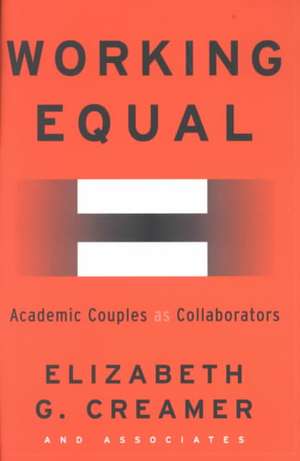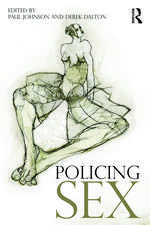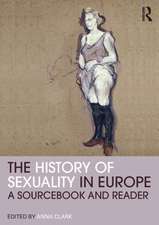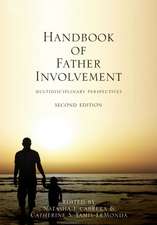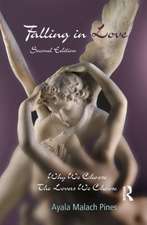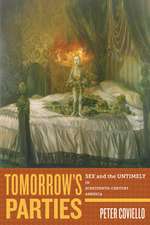Working Equal: Collaboration Among Academic Couples: RoutledgeFalmer Studies in Higher Education
Editat de Elizabeth Creameren Limba Engleză Paperback – 14 dec 2000
| Toate formatele și edițiile | Preț | Express |
|---|---|---|
| Paperback (1) | 422.59 lei 6-8 săpt. | |
| Taylor & Francis – 14 dec 2000 | 422.59 lei 6-8 săpt. | |
| Hardback (1) | 894.53 lei 6-8 săpt. | |
| Taylor & Francis – 19 dec 2000 | 894.53 lei 6-8 săpt. |
Din seria RoutledgeFalmer Studies in Higher Education
-
 Preț: 184.91 lei
Preț: 184.91 lei - 18%
 Preț: 1272.79 lei
Preț: 1272.79 lei -
 Preț: 455.78 lei
Preț: 455.78 lei - 15%
 Preț: 209.80 lei
Preț: 209.80 lei -
 Preț: 266.93 lei
Preț: 266.93 lei -
 Preț: 475.27 lei
Preț: 475.27 lei - 13%
 Preț: 351.24 lei
Preț: 351.24 lei -
 Preț: 472.72 lei
Preț: 472.72 lei -
 Preț: 396.90 lei
Preț: 396.90 lei - 13%
 Preț: 348.40 lei
Preț: 348.40 lei -
 Preț: 482.35 lei
Preț: 482.35 lei -
 Preț: 128.51 lei
Preț: 128.51 lei - 16%
 Preț: 216.07 lei
Preț: 216.07 lei -
 Preț: 309.69 lei
Preț: 309.69 lei -
 Preț: 480.46 lei
Preț: 480.46 lei - 18%
 Preț: 841.31 lei
Preț: 841.31 lei - 18%
 Preț: 1006.07 lei
Preț: 1006.07 lei -
 Preț: 482.35 lei
Preț: 482.35 lei - 13%
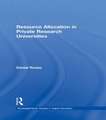 Preț: 351.24 lei
Preț: 351.24 lei -
 Preț: 442.50 lei
Preț: 442.50 lei -
 Preț: 482.01 lei
Preț: 482.01 lei -
 Preț: 482.35 lei
Preț: 482.35 lei -
 Preț: 484.26 lei
Preț: 484.26 lei -
 Preț: 198.19 lei
Preț: 198.19 lei -
 Preț: 442.50 lei
Preț: 442.50 lei - 15%
 Preț: 209.80 lei
Preț: 209.80 lei - 26%
 Preț: 848.40 lei
Preț: 848.40 lei - 13%
 Preț: 351.24 lei
Preț: 351.24 lei -
 Preț: 314.54 lei
Preț: 314.54 lei -
 Preț: 373.22 lei
Preț: 373.22 lei -
 Preț: 477.02 lei
Preț: 477.02 lei - 18%
 Preț: 946.61 lei
Preț: 946.61 lei -
 Preț: 326.54 lei
Preț: 326.54 lei -
 Preț: 261.71 lei
Preț: 261.71 lei - 18%
 Preț: 1054.75 lei
Preț: 1054.75 lei - 25%
 Preț: 683.73 lei
Preț: 683.73 lei
Preț: 422.59 lei
Nou
Puncte Express: 634
Preț estimativ în valută:
80.86€ • 84.67$ • 67.07£
80.86€ • 84.67$ • 67.07£
Carte tipărită la comandă
Livrare economică 09-23 aprilie
Preluare comenzi: 021 569.72.76
Specificații
ISBN-13: 9780815335450
ISBN-10: 0815335458
Pagini: 268
Dimensiuni: 138 x 216 x 14 mm
Greutate: 0.45 kg
Ediția:New.
Editura: Taylor & Francis
Colecția Routledge
Seria RoutledgeFalmer Studies in Higher Education
Locul publicării:Oxford, United Kingdom
ISBN-10: 0815335458
Pagini: 268
Dimensiuni: 138 x 216 x 14 mm
Greutate: 0.45 kg
Ediția:New.
Editura: Taylor & Francis
Colecția Routledge
Seria RoutledgeFalmer Studies in Higher Education
Locul publicării:Oxford, United Kingdom
Notă biografică
Elizabeth Creamer is Professor of Women's Studies, and an Adjunct in Higher Education and Student Affairs at Virginia Polytechnic and State University in Blacksburg, Virginia. She is the author of more than thirty book chapters and refereed journal articles, as well as the 1998 book, Assessing Faculty Publishing Productivity: Issues of Equity. Her research interests are on the topics of gender differences in the correlates of faculty publishing productivity, diversity in higher education, and scholarly collaboration
Cuprins
1. Introduction Part One: The Case Narratives 2. Introduction to the Case Narratives 3. Introduction to the First Case: Intellectual Homesteading: Disciplinary Crossover among Geographers 4. The First Case: Intellectual Homesteading: Disciplinary Crossover Among Geographers 5. Collaboration as a Way of Being, a Way of Living: A Response to the First Case -Yvonna Lincoln 6. Introduction to the Second Case: Different Chapters, Same Textbook: Collaboration between Psychologists in the Same Department 7. The Second Case: Different Chapters, Same Textbook: Collaboration between Psychologists in the Same Department 8. Don't Ask, Don't Tell: A Response to the Second Case Study -Peter Magolda 9. Introduction to the Third Case: Experiencing Africa: A Creative Writer and an Anthropologist Collaborate 10. The Third Case: Experiencing Africa: A Creative Writer and an Anthropologist Collaborate 11. Seeing and Being Seen: Examining the Inner Visions between Race, Relationality, and Research: A Response to Experiencing Africa -Stacey Floyd-Thomas Part Two: The Social Nature of Faculty Scholarship 12. Different, But the Same: Introduction to the Invited Chapters 13. Reviewing the Literature on Scholarly Collaboration among Academic Couples -Ann E. Austin 14. The Importance of Collegial Networks to College and University Faculty - Jeffrey F. Millem, Joe Sherlin, and Laura Irwin 15. The Role of Recognition and Reward in Research Productivity: Implications for Partner Collaboration - Jane W. Loeb Part Three: Implications for Couples and Academic Workplace 13. Egalitarianism, Institutional Policies, and Productivity
